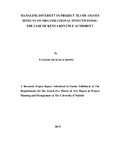| dc.contributor.author | Wanjohi, Michael Kariithi | |
| dc.date.accessioned | 2015-09-05T08:33:50Z | |
| dc.date.available | 2015-09-05T08:33:50Z | |
| dc.date.issued | 2015 | |
| dc.identifier.citation | Master of arts degree in project planning and management | en_US |
| dc.identifier.uri | http://hdl.handle.net/11295/90595 | |
| dc.description.abstract | Diversity management in teams becoming increasingly important to organizations.
This study investigated the concept of diversity management in project teams and the
influence on organizational effectiveness. The purpose of the study was to determine
whether the management of diversity of teams in the Project Management and
Business Analysis Office (PMBO) influenced organizational effectiveness at KRA.
Four objectives that guided the research were: to determine the influence of managing
cultural diversity in PMBO teams on organizational effectiveness; to establish the
influence of managing demographic diversity of PMBO teams on organizational
effectiveness; to investigate the influence of managing cognitive diversity of PMBO
teams on organizational effectiveness; and to assess the influence of managing
technical diversity of PMBO teams on the organizational effectiveness of KRA. The
study was carried out at the PMBO Nairobi offices at KRA. It was restricted to
Nairobi County due to time limitations and inability to travel to all county offices to
collect data from PMBO staff. The target population was 200 project managers and
team members. A sample size of 180 was used. Structured questionnaires were
designed and pilot tested for validity. The questionnaire was collected after one week
and reminders sent to ensure high response rates. Responses were analyzed using
quantitative methods. Descriptive statistics and correlation tests using Statistical
Package for Social Sciences (SPSS) formed the basis of the quantitative analysis.
Results of quantitative analysis showed that the management of cultural diversity,
cognitive diversity, demographic diversity and technical diversity influenced
organizational effectiveness. The management of cultural diversity had a strong
positive correlation (0.732) with organizational effectiveness. Religion and ethnicity
were found to have a greater influence on the teams in the organization. The
management of demographic diversity had a weak positive correlation of 0.482 with
organizational effectiveness. Age and geographic differences were found to have
greatest effect on the project teams at PMBO. There was a weak positive correlation
(0.313) between the management of technical diversity and organizational
effectiveness. Similarly, there was a weak positive correlation (0.368) between the
management of cognitive diversity and organizational effectiveness. Regression
results showed that cultural diversity management had greater effect on organizational
effectiveness at 53.5% followed by the management of demographic diversity
(23.2%), the management of cognitive diversity (13.6%) and the management of
technical diversity (9.7%).
The study concludes that cultural diversity has the greatest influence on
organizational effectiveness while technical diversity has lower influence on
organizational effectiveness. The study recommends that project managers at PMBO
could improve cultural diversity by resolving ethnic conflict and encouraging
multilingual communication. PMBO could improve demographic diversity by
accentuating a culture of respect, providing diversity training and developing norms
for demographically teams. Recommendations for improving technical diversity are
accommodating alternative perspectives and encouraging cognition among
technically-diverse group members while recommendations for improving cognitive
diversity are developing cross-functional groups and information integration. The
study proposes that the study be carried out on a larger scale to develop a better
understanding of the effect of managing diversity in teams on organizational
effectiveness. | en_US |
| dc.language.iso | en | en_US |
| dc.publisher | University of Nairobi | en_US |
| dc.title | Managing diversity in project teams and its effects on organizational effectiveness: the case of Kenya Revenue Authority | en_US |
| dc.type | Thesis | en_US |
| dc.type.material | en_US | en_US |

